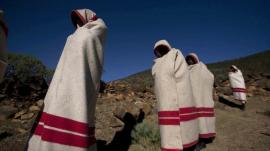
To ensure the integrity of the upcoming customary initiation season in December, the safety and well-being of all initiates must be prioritised, as required by the Customary Initiation Act of 2021.
This is according to the Minister of Cooperative Governance and Traditional Affairs (CoGTA), Velenkosini Hlabisa, who made the remark during a media briefing on South Africa’s preparedness for the upcoming summer season and disaster response.
The Customary Initiation Act established the National Initiation Oversight Committee (NIOC) and Provincial Initiation Coordinating Committees (PIOCs).
These committees work together with traditional leaders, parents and communities to oversee initiation practices, ensuring they adhere to legal and health standards.
“The Act is a vital tool for eliminating abuse and dangerous practices, aiming to safeguard young initiates through clearly defined norms and safety protocols,” he said at Monday’s briefing.
Initiation is a sacred and respected custom practised as a rite of passage to adulthood. In South Africa, it is observed by various traditional communities, especially in the Eastern Cape.
With the forecast of extreme summer heat, Hlabisa urged that all initiates undergo pre-season health checks, stay hydrated and have access to medical care.
To further protect the youth, he called on initiation schools to secure parental consent, comply with health guidelines, and register at least three months before each initiation season.
“We call on all South Africans to work with us and play their part by reporting illegal schools to law enforcement to prevent the exploitation and endangerment of young initiates,” Hlabisa said.
He called on all stakeholders to act responsibly and to ensure the initiates experience this tradition with dignity, safety and respect for cultural heritage.
“While the risks posed by the upcoming summer season are significant, we face them with a solid plan, a unified response, and a deep commitment.
“The path to resilience is paved with collaboration, preparedness and dedication. Together, we will overcome the challenges ahead and emerge more robust as a nation to face and mitigate climate change effects that we are experiencing.”
Funding for disasters
Meanwhile, the Minister announced that CoGTA and National Treasury are working together to explore new funding mechanisms, as the country experiences more disaster events.
He said a funding request has been submitted to Treasury to support affected groups and organisations with the reconstruction and rehabilitation of damaged infrastructure.
“We acknowledge the challenges faced by the country in funding disaster interventions, mainly due to increased disaster damages, fiscal deficit and competing priorities.
“The Department of Cooperative Governance and Traditional Affairs is currently engaging National Treasury on other funding mechanisms to ensure sustainability,” he said.
Government is also working around the clock to enhance the weather early warning system, which is core to the State’s preparedness for disaster events.
“We have strengthened our collaboration with the SAWS [South African Weather Service] to ensure accurate, timely weather warnings reach every corner of our country, especially vulnerable communities,” Hlabisa said.
By providing early information about potential hazards like thunderstorms, flash floods, lightning and heat waves, the Minister said citizens can be empowered to take the necessary precautions and protect their lives and properties.
READ | CoGTA, Treasury work together on disaster relief funding
“Early warnings and early action are the most effective means of saving lives," he stressed. – SAnews.gov.za


